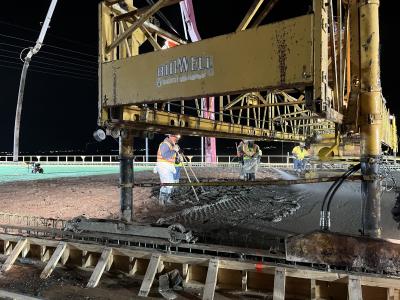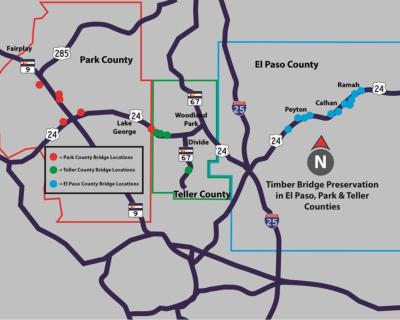A Raleigh-based company has found a way to move material out of its quarries that it believes will save dump trucks full of money over time.
Carolina Sunrock LLC, a construction materials firm that supplies aggregates, asphalt and concrete to construction projects across the Southeast, has recently begun handling and transporting rock out of its new Woodsdale quarry in Person County via conveyor belt.
The process at the quarry begins with drilling and blasting, so the granite is in a movable condition.
The company is no longer using dump trucks to move the rock from the pits to crushing and screening areas in another location. Rather, the firm positions equipment at the blast site, where a primary crusher receives the rock from an excavator and crushes it to a manageable size before moving it via a Powerscreen 5026 track conveyor to more than 2,000 ft. (610 m) of land conveyors to a secondary operation located at the top of the quarry.
From there, the material is screened and crushed again before conveyed another 1,000 ft. (305 m) to a Powerscreen wash plant and readied for sale to Sunrock clients.
By eliminating the use of dump trucks, which are expensive to operate and maintain, the company expects to see a big cost savings, according to John Tankard, vice president of plant and equipment services of Sunrock.
"The cost of trucks got to the point that we felt the overland conveyor systems would save us some money, which it has," he said. "We are still using diesel fuel with this equipment, but not to the extent that we would with trucks. The life cycle of trucks is much shorter than what these conveyors will be."
This method of handling and moving rock, Tankard said, is much more common in Europe, but may become more popular in the United States if fuel costs remain high. He added that the method has worked so well at Woodsdale that his company plans to begin using the same method at its Kittrell granite facility in Vance County.
Sunrock bought most of the crushing and screening equipment it uses at the Woodsdale site from Powerscreen Mid-Atlantic Inc. in Kernersville. Sunrock worked primarily with Mike Andrews and Ian Williamson, Powerscreen Mid-Atlantic's sales managers, on purchasing Terex Pegson and Powerscreen equipment for its quarry operations.
"The way Sunrock is running that operation is just normally not done that way around here," said Williamson. "They are operating this whole quarry operation without any dump trucks and as a result, their cost of producing rock is much lower than their competitors."
The 500 ton (450 t) per hour Woodsdale granite quarry was a green field site just a year ago. It took four months to prepare the site, during which 600,000 cu. yds. (459,000 cu m) of overburden was removed.
The quarry's crushing and screening operation divided into three sections, according to Williamson.
The first section is in the pit itself and is where the primary crushing is done using a Terex Pegson 32x44 Super Heavy Duty Premiertrak. This jaw crusher accepts the primary crusher feed material and reduces the granite to minus 6 in. Because the jaw crusher is track mounted the machine can be positioned right at the blasted material, where a large excavator can then load it.
Feeding the jaw crusher with an excavator is also beneficial to Sunrock, Williamson said, as the operator has greater control over what size feed he places into the machine, thereby reducing downtime caused by oversize material being placed into the crusher.
The crushed material is then loaded into a hopper that feeds a series of land conveyors that transports the material to the secondary operation.
The second section consists of a Powerscreen Horizon 6- by 20-ft. (1.8 by 6.1 m), three-deck horizontal screen that removes the fine material. The rest of the material travels to a surge bin that feeds a Terex Pegson 1300 Maxtrak, which Williamson characterizes as "a high production, high reduction, high speed cone" that reduces the material to a well-graded and fine aggregate. That material is then conveyed to another surge pile that feeds a Powerscreen wash plant that screens and washes the material into certified graded products.
The end result is material that can be used for asphalt, concrete, roads and driveways and is approved for highways by the DOTs in Virginia and North Carolina.
"Sunrock is obviously saving on fuel costs, but mostly it is very hard work to run trucks up haul ramps with beds full of rocks," Williamson added. "They end up having a lot of tire and transmission trouble and that can be very expensive."
Tankard said that his company would continue to use dump trucks to handle rock at its much larger Butner trap rock quarry. He added that if Sunrock opens any more green field sites in the future it would most likely use this new rock handling method.
Besides its three quarries, Sunrock also operates five concrete plants and four asphalt plants in the Raleigh area. The company relocated its corporate headquarters to Raleigh from Butner about two months ago.
Powerscreen Mid-Atlantic is the North Carolina dealer for all Powerscreen equipment, a manufacturer of dry screening, washing and recycling equipment for the quarry, mining and recycling industries processing aggregates, coal, construction and demolition waste. The Kernersville firm also has a complete line of crushing equipment from Terex Pegson, a British-based manufacturer of tracked crushing plants that includes jaws, cones and impactors.
(This story also can be found on Construction Equipment Guide's Web site at www.cegltd.com.) CEG
This story also appears on Aggregate Equipment Guide.
Eric Olson
A writer and contributing editor for CEG since 2008, Eric Olson has worked in the news-gathering business for 45 years.
Olson grew up in the small town of Lenoir, N.C. in the foothills of the Blue Ridge Mountains, where he began covering sports for the local newspaper at age 18. He continued to do that for several other dailies in the area while in college at Appalachian State University. Following his graduation, he worked for, among other companies, the Winston-Salem Journal, where he wrote and edited the newspaper's real estate and special features sections for 10 years. Since 1999 he has worked as a corporate media liaison and freelance writer, in addition to his time at CEG.
He and his wife, Tara, have been happily married for almost 40 years and are the parents of two grown and successful daughters. He currently is in the employ of two dogs and three cats, a job that he dearly loves.
Read more from Eric Olson here.
Today's top stories










